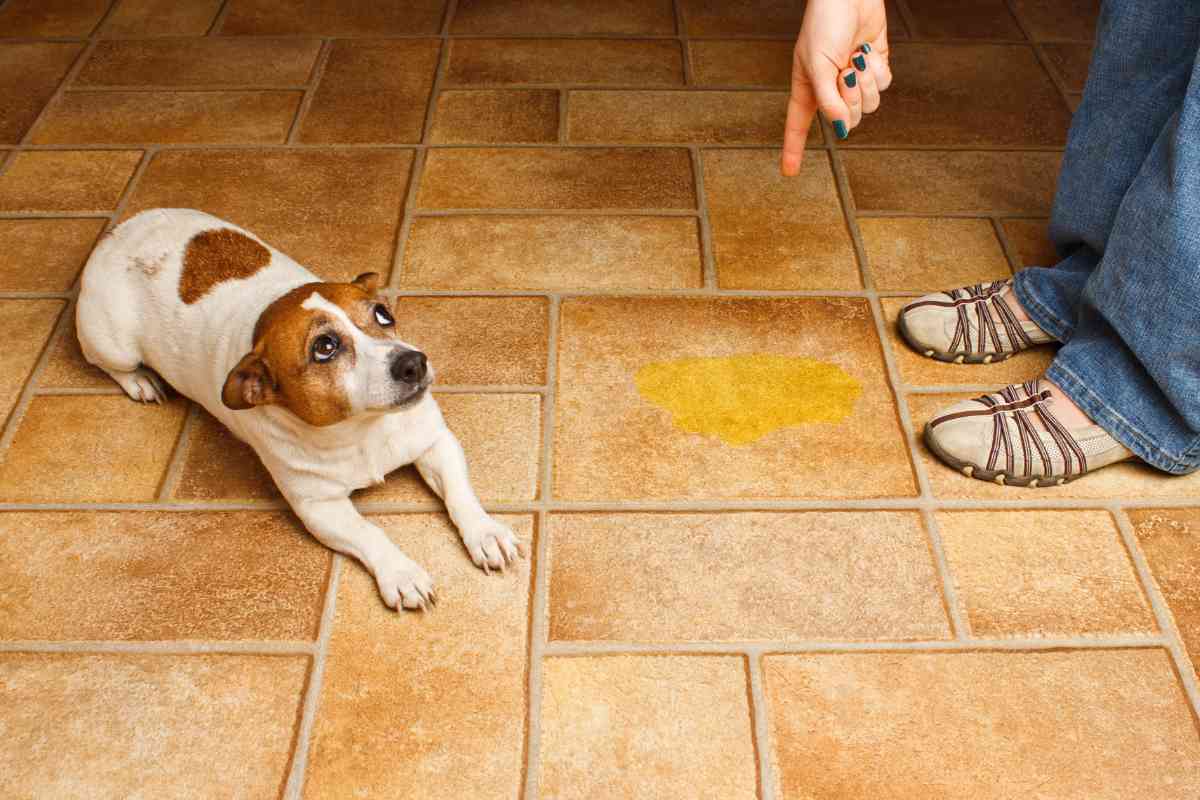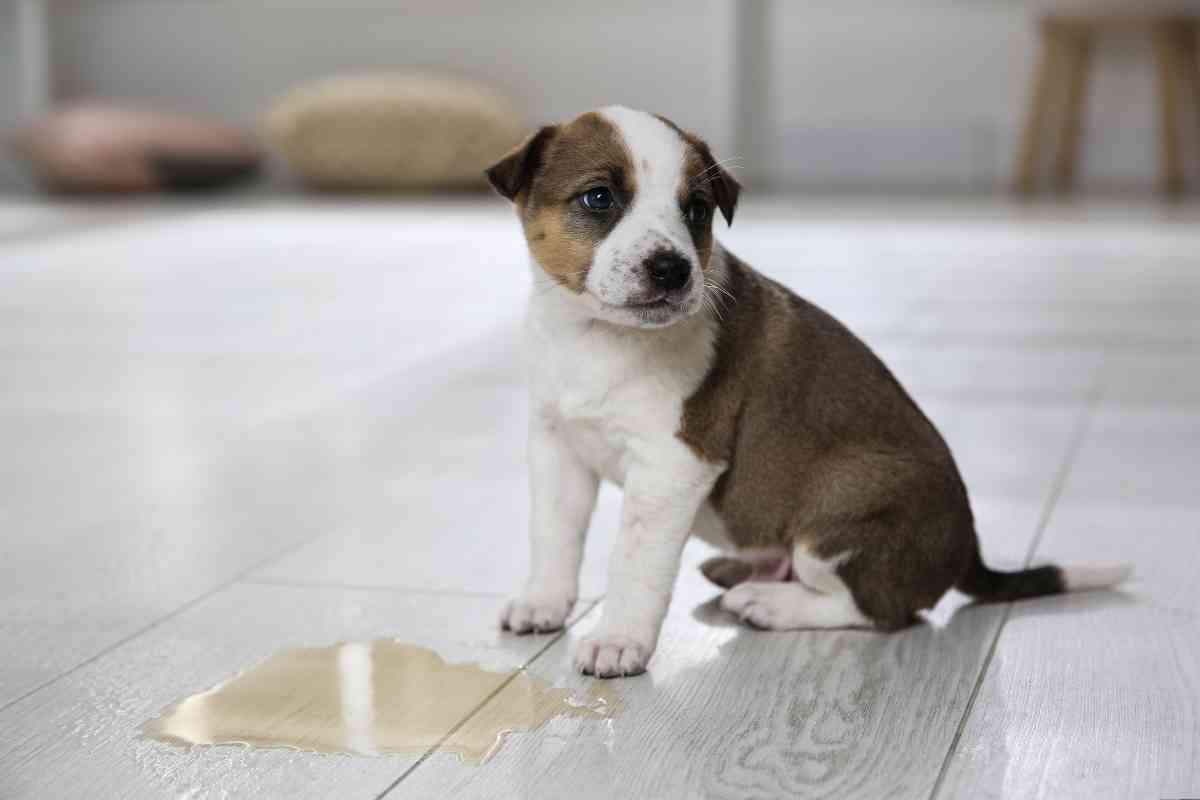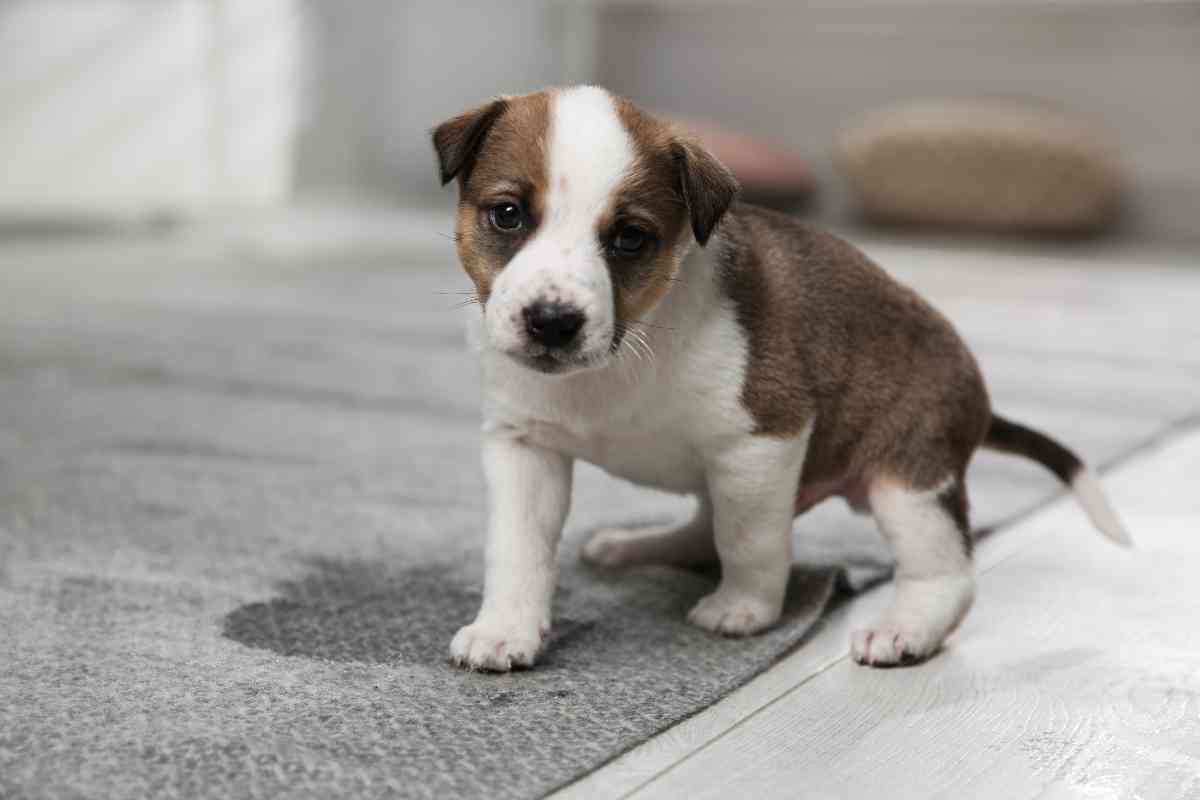8 Reasons Why Your Puppy Started Peeing In The House Again
Has your puppy started urinating inside the house, but you can’t figure out why? Well, here are the reasons why your puppy started peeing in the house again.
Your puppy may have started peeing in the house again because of fear or anxiety, incontinence, changes in the house, loss of house training, or bad weather. Also, it may have started peeing in the house again due to medical conditions such as diabetes, UTI, liver problems, and kidney problems.
You’ve been enjoying a harmonious relationship with your house-trained puppy for a couple of months. But all of sudden, your puppy starts peeing in the house again, even when it’s well past its potty-training stage.
Inappropriate urination can be a big convenience to you.
And without a doubt, this behavior can be extremely frustrating and disappointing, considering the number of hours or resources you may have spent on your puppy’s potty training.
So, why does inappropriate urination happen? What should you do when your potty-trained puppy begins peeing around the house? Well, we’ve researched this topic further and we have the answers.
In this guide, we will walk you through some of the reasons why your puppy may have started peeing in the house again.
We will also share tips on how to address the issue and help your puppy get back on track. By the end of the article, you should be in a position to address the problem of your puppy staying in the house.
Reasons Why Your Puppy is Peeing in the House Again

There are several reasons why your puppy may start peeing in the house again. And, these reasons will vary from one dog breed to the other.
Let’s take a closer look at some of the reasons why your potty-trained puppy may have started peeing in the house again.
Fear and Anxiety
Fear or anxiety can cause inappropriate urination in puppies. Some of the things that can trigger this fear and anxiety include loud fireworks or extremely loud music.
Also, if you have suddenly started getting new visitors, these new visitors may lead to fear and anxiety in your puppy.
Furthermore, reprimanding your puppy for bad behavior can also trigger fear or anxiety response. Just like a child fears an overbearing parent, the puppy may fear a very strict homeowner.
Your puppy may have a single inappropriate urination when feeling fearful or anxious. However, if whatever is triggering the fear or anxiety doesn’t stop, then your puppy may continue with the inappropriate urination.
Territory Marking
Dogs, both older and younger, may sometimes pee somewhere to mark their territory. In light of this, if your puppy is peeing inside the house, it’s probably trying to communicate that the house is its territory and wants a space of its own.
This mainly happens whenever there’s an arrival of a new pet in the house.
If your puppy is territory marking, it will only pee a little as opposed to emptying its bladder. Also, you may notice that the dog is peeing mainly on vertical objects instead of the surface.
So, if you’ve recently brought a new puppy to the house and the resident one has started peeing inside, then it may be simply a case of territorial marking.
Changes in your House
Changes in your house, both minor and major, can also lead to inappropriate urination.
Some of the changes that can lead to this behavior include introducing a relative into the house, getting a new baby, rearranging the existing house, bringing in new furniture, moving to a new house or undertaking major indoor renovations.
Also, minor changes in your daily routine such as changes in your school or work schedule, having visitors over for a couple of days or changing the time that you take your puppy out for a walk may cause urinary accidents.
But in most cases, this issue won’t last long. Once the puppy settles into these new changes, it’s likely the issue will stop.
Incontinence
Incontinence can also lead to inappropriate urination in both young and older dogs. For puppies, you may start observing this problem shortly after they’ve been spayed or neutered.
So, if your puppy starts experiencing urinary accidents a few days after being neutered or spayed, there’s a high chance that these recent changes may be the cause.
For incontinence, you may start noticing urine puddles around the dog’s napping areas.
Loss of House Training

As much as your puppy may have been completely house-trained, it may still experience setbacks for some reason.
For instance, if your puppy has been relocated between several households or families, they can experience loss or setbacks in house training.
This mostly affects dogs from rescue homes. And, these setbacks in house training may cause urinary accidents.
Also, shifting to a new house or apartment can cause loss of housetraining. Furthermore, bringing a new puppy to your home may also cause your older puppy to revert to inappropriate habits such as peeing inside the house.
Some illnesses can also cause your puppy to experience setbacks in house training, leading to inappropriate urination.
Submissive Urination
Submissive urination refers to a dog’s instinctive and uncontrollable reaction in the presence of another dog they feel is intimidating or superior.
As much as it mainly affects adult dogs, it can also happen to puppies.
This issue may affect puppies living in a multiple-dog home, or puppies rescued from abusive environments.
Puppies that have been rescued from abusive environments may exhibit this behavior even with gentle interaction with humans or other dogs.
As for puppies living in multiple-dog homes, they will exhibit this behavior for the simple fact they aren’t the alpha dog.
Your puppy may also urinate inside the house after reprimanding it verbally. And, this is yet another form of submissive urination.
Bad Weather
Bad weather may also be the reason why your puppy starts peeing in the house again. For instance, if there’s a snowstorm, a severe thunderstorm, or heavy rain, then your puppy may be reluctant to go for a bathroom break outside.
And if the bad weather continues for some days, then your puppy may also continue peeing inside the house.
Also, if your puppy has experienced something traumatic or upsetting outside like a wild animal, they may stop going for their potty outside.
Instead, they may begin peeing inside the house.
Medical Issues
Some diseases like kidney problems, prostate problems, diabetes, liver problems, intestinal parasites, bladder stones, tumors, and Cushing’s disease can trigger urinary accidents in puppies.
Also, some drug-related issues like toxin ingestion and chronic steroid use may cause inappropriate urination in puppies.
If the issue is medical-related, inappropriate urination can happen suddenly at the onset of the disease and then disappear.
It may also worsen gradually with time if the disease is not attended to on time.
Besides inappropriate urination, you may also observe some additional symptoms like reduced appetite, increased thirst, gastrointestinal problems like vomiting and diarrhea, skin problems or lethargy.
How to Stop Your Puppy from Peeing in the House

If your puppy has started peeing in the house, the first course of action would be to identify the cause.
The course of action you will take to address the issue will depend on what’s causing the inappropriate urination.
Identify the Cause of the Problem
As we mentioned above, you will first need to identify whether your puppy has started peeing inside the house. Usually, there are two main causes of inappropriate urination – behavioral and medical.
And there are a couple of strategies you can employ to identify the root of the problem.
First, you should assess your home, your surrounding environment, your routine, as well as any changes that may have caused this problem.
If the problem has started after you’ve introduced a new puppy to the house, then there’s nothing much you can do. You simply need to give your puppy more time so that it can get used to the new pet.
If the problem is arising due to severe weather conditions or a traumatic experience that’s making your puppy reluctant to go outside, you should consider changing their current potty location and providing them with a sheltered area.
If your puppy has started peeing inside due to some recent changes in your house, then you will simply need to be patient with them, as they get used to the new surroundings or environment.
Visit a Vet
If your puppy is having additional symptoms apart from inappropriate urination, then there’s a high chance it has a medical issue. If this is the case, you will need to take it to a vet as soon as possible.
The vet will then conduct a series of tests to try and determine the root of the problem.
For instance, they may run urine tests to check for common issues like urine crystals or UTIs, which can often affect the puppies as they grow and develop.
The vet may also undertake additional tests like abdominal x-rays or full blood work.
After conducting these tests, the vet will identify the issue and then recommend the appropriate treatment regimen.
Retrain Your Puppy
Regardless of whether your puppy has started peeing in the house due to a behavioral or medical issue, its house-training awareness has somehow disappeared.
Therefore, you will need to retrain your puppy so that you can remind it where it’s supposed to take bathroom breaks.
As you re-train your puppy, you should refrain from punishing it in any way. Whether it’s hitting it, confining it to a crate, scolding it, or yelling at it, these punitive measures won’t help the situation. In fact, they may even end up worsening it. So, you will need to be patient with your dog as you work to solve the problem.
Key Takeaways
- Inappropriate urination can affect puppies of all ages
- Inappropriate urination mainly happens due to behavioral issues
- Your puppy can also start peeing in the house due to a medical condition
- You will need to identify the cause of the problem and then apply appropriate measures to stop your puppy from peeing inside the house